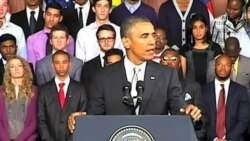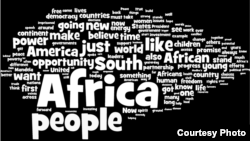CAPE TOWN, SOUTH AFRICA —
U.S. President Barack Obama has outlined a new model for U.S. engagement with Africa, supporting greater economic opportunity and democracy, and African-led solutions to security.
At the University of Cape Town, Obama presented a broad picture of his goals for U.S.-Africa policy, including assistance, trade and investment, health, and security cooperation.
The speech was framed around the legacy Obama said former president Nelson Mandela has left for the continent.
Earlier he and his family visited Robben Island, where Mandela spent nearly two decades of his 27 years in prison under the former apartheid regime. “Nelson Mandela showed us that one man's courage can move the world and he calls on his to make choices that reflect not our fears, but our hopes, in our own lives and in the lives of our communities and our countries," he said.
Obama said the United States will “up our game” in a continent he described as “poised to take off," with new trade and investment and steps to bring down trade barriers.
He spoke about his food security initiative to help lift 50-million people out of poverty within a decade. And he announced a “Power Africa” initiative to double access to power in sub-Saharan Africa, with an initial investment of $7 billion.
Obama said he will continue seeking ideas from Africa's young people about their continent's future. He announced his plan to hold a first-ever summit in Washington of sub-Saharan African leaders.
“I am proud to announce that next year, I am going to invite heads of state from across sub-Saharan Africa to a summit in the United States to help launch a new chapter in U.S.-Africa relations," he said.
The president spoke of a “historic shift” in Africa from poverty to a growing middle class with fewer people dying of preventable disease, but still threatened by the “rot of corruption” and conflict.
“It is not moving fast enough for the child still languishing in poverty in forgotten townships. It is not moving fast enough for the protester who is beaten in Harare, or the woman who is raped in Eastern Congo. We have got more work to do because these Africans must not be left behind," he said.
Obama called South Africa an example of the difference between freedom and tyranny, saying governments “should exist to serve their people and not other way around.”
Citing free and fair elections and the growth of civil society from Ghana to Zambia, he said governments that respect the rights of their citizens and abide by the rule of law do better and draw more investment.
In Zimbabwe, he said only a credible election can help repair the country's economy. “There is an opportunity to move forward, but only if there is an election that is free and fair and peaceful so that Zimbabweans can determine their future without fear of intimidation and retribution. And after elections there must be respect for the universal rights upon which democracy depends," he said.
Obama said the United States is interested in investing not in “strong men, but in strong institutions” and supports open and accountable governments, independent judiciaries, and societies that empower women. “No country will reach its potential unless it draws on the talents of our mothers and our sisters and our daughters," he said.
Obama said opportunity and democracy cannot take root as long as fear prevails in too many places, citing conflicts in Mali, Somalia, Congo and Sudan.
He said the United States supports African-led solutions, noting U.S. support for African Union peacekeeping in Somalia and efforts against the rebel Lord's Resistance Army in central Africa.
“From Mali to Mogadishu, senseless terrorism all too often perverts the meaning of Islam one of the world's great religions and takes the lives of countless innocent Africans. From Congo to Sudan, conflicts fester robbing men and women and children of the lives they deserve. In too many countries the actions of thugs, and warlords and drug cartels and human traffickers hold back the promise of Africa, enslaving others for their own purposes," he said.
He said America makes no apology for helping African efforts to end conflict and stand up for human dignity.
Earlier, Obama joined retired Archbishop Desmond Tutu at a youth center named after him for AIDS prevention.
“Your success is our success. Your failure, whether you like it or not, is our failure. And so we want to assure you that we pray for you to be a great success. We want you to be known as having brought peace to the world," said Tutu.
President Obama and his family depart early Monday for Tanzania, the final stop on his three-nation Africa tour.
At the University of Cape Town, Obama presented a broad picture of his goals for U.S.-Africa policy, including assistance, trade and investment, health, and security cooperation.
The speech was framed around the legacy Obama said former president Nelson Mandela has left for the continent.
Earlier he and his family visited Robben Island, where Mandela spent nearly two decades of his 27 years in prison under the former apartheid regime. “Nelson Mandela showed us that one man's courage can move the world and he calls on his to make choices that reflect not our fears, but our hopes, in our own lives and in the lives of our communities and our countries," he said.
Obama said the United States will “up our game” in a continent he described as “poised to take off," with new trade and investment and steps to bring down trade barriers.
He spoke about his food security initiative to help lift 50-million people out of poverty within a decade. And he announced a “Power Africa” initiative to double access to power in sub-Saharan Africa, with an initial investment of $7 billion.
Obama said he will continue seeking ideas from Africa's young people about their continent's future. He announced his plan to hold a first-ever summit in Washington of sub-Saharan African leaders.
“I am proud to announce that next year, I am going to invite heads of state from across sub-Saharan Africa to a summit in the United States to help launch a new chapter in U.S.-Africa relations," he said.
The president spoke of a “historic shift” in Africa from poverty to a growing middle class with fewer people dying of preventable disease, but still threatened by the “rot of corruption” and conflict.
“It is not moving fast enough for the child still languishing in poverty in forgotten townships. It is not moving fast enough for the protester who is beaten in Harare, or the woman who is raped in Eastern Congo. We have got more work to do because these Africans must not be left behind," he said.
Obama called South Africa an example of the difference between freedom and tyranny, saying governments “should exist to serve their people and not other way around.”
Citing free and fair elections and the growth of civil society from Ghana to Zambia, he said governments that respect the rights of their citizens and abide by the rule of law do better and draw more investment.
In Zimbabwe, he said only a credible election can help repair the country's economy. “There is an opportunity to move forward, but only if there is an election that is free and fair and peaceful so that Zimbabweans can determine their future without fear of intimidation and retribution. And after elections there must be respect for the universal rights upon which democracy depends," he said.
Obama said the United States is interested in investing not in “strong men, but in strong institutions” and supports open and accountable governments, independent judiciaries, and societies that empower women. “No country will reach its potential unless it draws on the talents of our mothers and our sisters and our daughters," he said.
Obama said opportunity and democracy cannot take root as long as fear prevails in too many places, citing conflicts in Mali, Somalia, Congo and Sudan.
He said the United States supports African-led solutions, noting U.S. support for African Union peacekeeping in Somalia and efforts against the rebel Lord's Resistance Army in central Africa.
“From Mali to Mogadishu, senseless terrorism all too often perverts the meaning of Islam one of the world's great religions and takes the lives of countless innocent Africans. From Congo to Sudan, conflicts fester robbing men and women and children of the lives they deserve. In too many countries the actions of thugs, and warlords and drug cartels and human traffickers hold back the promise of Africa, enslaving others for their own purposes," he said.
He said America makes no apology for helping African efforts to end conflict and stand up for human dignity.
Earlier, Obama joined retired Archbishop Desmond Tutu at a youth center named after him for AIDS prevention.
“Your success is our success. Your failure, whether you like it or not, is our failure. And so we want to assure you that we pray for you to be a great success. We want you to be known as having brought peace to the world," said Tutu.
President Obama and his family depart early Monday for Tanzania, the final stop on his three-nation Africa tour.














